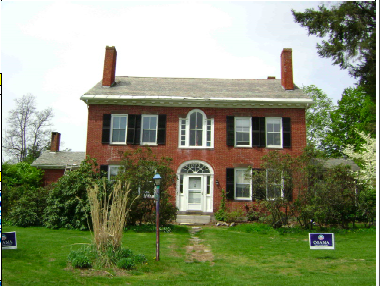REPORT: ZONING BOARD OF APPEALS MEETING (9/26/19)

Photo:bluediamondgallery.com (creative commons)
Present: Mark Parent (Chair), Joan O’Meara, Steve Judge, Tom Simpson, and Associate Member Tammy Parks. NOTE: the Zoning Board currently has one vacancy for a full member.
Highlights
- Public hearing on variance for 410 Old Montague Road
- Building permit for Aspen Heights Apartments
Public Hearing on Variance for 410 Old Montague Road
The Zoning Board of Appeals (ZBA) at a Public Hearing on September 26, 2019, found itself in a conundrum when Nancy Gittelman applied for a variance to modify a variance granted in 1968 (ZBA1968-20) that had allowed three rental apartments and a museum for property that she has owned or co-owned since 1995 at 410 Old Montague Road.
The Commonwealth court system does not favor variances and Massachusetts General Laws makes awarding them very difficult.

The Town of Amherst Zoning Bylaw Section 10.2 states: “Petitions of [sic] variances from the terms of the applicable zoning provisions shall be dealt with by the Board of Appeals in accordance with Chapter 40A of the [Massachusetts] General Laws, as amended. The Board shall grant no variances which would amount to an amendment of this Bylaw.”
The Rules and Regulations of the Board of Appeals reiterates Ch. 40A, that use variances are not permitted and no variances can be granted unless all four conditions of Ch.40A, section 10 are met.
The four conditions are:
1. Circumstances relating to soil conditions, shape, or topography that especially affect the property for which a variance is sought but do not generally affect the zoning district in which the land or structure is located.
2. Facts showing that substantial hardship, financial or otherwise, will result from literal enforcement of the applicable zoning restrictions to the land or building.
3. Facts supporting a finding that the relief sought will be desirable and without substantial detriment to the public good.
4. Facts supporting a finding that the relief sought may be given without nullifying or substantially derogating from the intent and purpose of the Zoning Bylaws. The Board may impose conditions and limitations both of time and of use, including the continued existence of any particular structures. However, the Board cannot impose conditions based on the continued ownership of the land or structures to which the variance pertains.
The property at 410 Old Montague Road is a grand brick Federal house built by Emily Dickinson’s great uncle Hezekiah Dickinson in about 1813, designed by the same architect and constructed by the same builder as the one who built Emily Dickinson’s house on Main Street. In 1934 the homestead left the family and was purchased by the Barstows for a 19-bed nursing home with additional structures (barn and carriage house) occupied by the nursing staff. In 1968, the family closed the nursing home because of stringent new regulations governing nursing homes and sold the property to Richard and Vivian Maxson. (Vivian was a beloved and respected North Amherst “lady” barber for decades.) They were world travelers who settled in Amherst to be near relatives who owned the Cherry Hill Golf Course down the road. The Maxsons ran a small museum of artifacts brought home from their travels, and had been granted a variance for three rental units and a museum. After the death of her husband in 1987, Vivian sold the property to Dennison Jones, who proceeded to break the house up into four units, with two more in the barn. An extensive search of public records found no permits for the conversions and reconstruction that were done.
Gittelman bought the property, containing 11 rental units, directly from Denny Jones (who also gave the second mortgage) in 1995. Gittelman apparently sold off a parcel with some buildings, such that she now has a total of five units. She rents out four of them and lives in a fifth unit. She has applied to be able to divide one unit (the one she lives in) into two at some future time.
The ZBA struggled to find sufficient facts that meet all four requirements of Ch. 40A to support granting a variance for six rental units in the Outlying Residence Zone (RO), where multi-family apartment dwellings are not allowed. There are no problems with the property’s shape, topography, or soil (presence of boulders) that are unique to this parcel. The Board cannot exceed its authority by overriding the zoning bylaw. There is no “hardship,” as defined by Ch. 40A.
Robert Morra, building commissioner/zoning enforcement officer, added that a new variance must comply with current building and sanitary codes.
Morra cited case law (Huntington v. Zoning Board of Appeals of Hadley, Kairis v. Board of Appeals of Cambridge, Cryan v. Board of Appeals of Salem, and others) and suggested that the Board might find a solution to this dilemma by modifying the existing 1968 variance to allow the creation of six rental units in place of the three created in 1968. This would eliminate the need for an entirely new variance. Ultimately the Board voted unanimously to approve modifying the existing variance, but appended a list of conditions that must be met, such as requiring that all the units be brought up to current codes.
Aspen Heights
The Board also decided that a building permit cannot be granted for Aspen Heights Apartments which abuts Greensleeves Drive until certain conditions are met. ZBA Chairperson Mark Parent recused himself because his mother resides at Greenleaves, the abutting senior housing unit. He was replaced for this decision by Associate Member Aaron Arcello.
